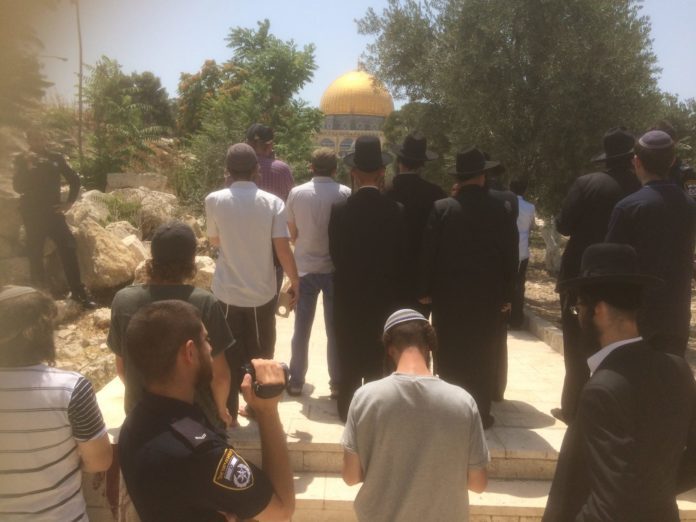Tensions Run High On Temple Mount, Despite Absent of Waqf Officials
JERUSALEM (TPS) – Jewish visitors were re-admitted to the Temple Mount Monday after a three-day closure following last Friday’s terror attack, but tensions remained sky-high at the holy site.
For the second day in a row, Waqf (Islamic trust) officials and many Palestinians boycotted the site to protest new Israeli security regulations, including metal detectors posted at the entrances to the compound. That gave Israeli Jews the opportunity to tour the site without being escorted by Waqf personnel or being harassed by the mourabitoun – Muslim groups who harass Jewish visitors outside the al-Aqsa Mosque.
Despite the Muslims’ absence, however – or perhaps because of it – the atmosphere on the Mount felt more charged than ever. Beginning at the security checkpoint at the bottom of the Mughrabi Bridge – the entry-point for non-Muslims to the site – Orthodox Jews were subjected to rigorous security and ID checks, as well as a detailed readout of regulations against prayer or Israeli nationalist expressions up above, and a stern warning not to try to capitalize on the lack of Islamic officials to try and violate the rules.
The warnings and the blazing sun did not deter about 20 Israeli Jews – surrounded by a similar number of security forces in riot gear – or dim their spirit. Waiting on the bridge for police to allow them into the site, the group – evenly split between national religious yeshiva students and ultra-Orthodox men – whiled the time singing songs about redemption and rebuilding the Temple.
Notably, however, the same could not be said for security forces assigned to surround the group and prevent stragglers from wandering off. Outside the compound, on-duty police said they could not discuss security arrangements, but at the Western Wall two officers said they had not received special instructions or briefings to deal with potential disturbances on or around the Temple Mount. Police spokespeople said only that “security measures continue today in and around the old city and the Temple Mount,” and added that “regular visits took place this morning.”
But as at other times, the presence of Jews on the Mount required a full-scale security operation, complete with two officers assigned to video the group and several rings of police and border police officers coordinating the group’s movements. Judging from the looks on their faces, the officers accompanying the group looked like they were charged with preventing an incident that could ignite nothing less than Armaggedon.
That did not prevent the Israelis group from celebrating what one person referred to as “zman cheruteinu”, Hebrew for “the time of our freedom” and a reference to the Passover festival that celebrates the Jews Biblical exodus from Egypt. Several people spent the 45-minute tour reciting (from memory) Torah and Talmudic passages relating to the sacrificial service in the Temple, while others discussed the technical details of visiting the Mount in keeping with the dictates of Jewish law (halacha).
Despite the overwhelming presence of security forces, the absence of Muslim officials did allow the Israelis to exercise a greater measure of religious freedom than is normally permitted at the Temple Mount. At the southern, northern and western ramps to the Dome of the Rock, the group was permitted to approach the steps leading up to the platform and discuss short ideas from the Torah. One woman seized the opportunity to recite a blessing thanking God for saving her life during a recent car accident.
“I was injured a month ago and I’m still recovering,” said the woman, who lives in Kiryat Arba and would identify herself only by her first name, Orit. “I felt a strong need to thank God for saving me – ideally, if we had the Temple I would have brought a thanksgiving offering. Instead, I had the incredible merit to stand here and recite the traditional blessing after surviving a dangerous situation, at the closest place we Jews are allowed to come to the holiest spot on earth, and to hear everybody answer ‘amen.’
“Just the thought of coming here for this occasion made me cry during the drive here. It’s an incredible privilege,” she told TPS.






